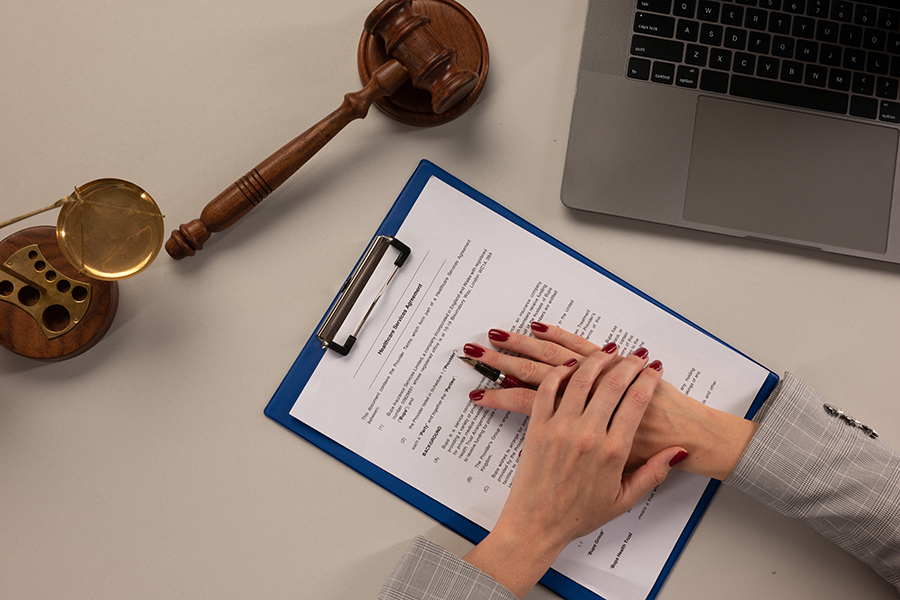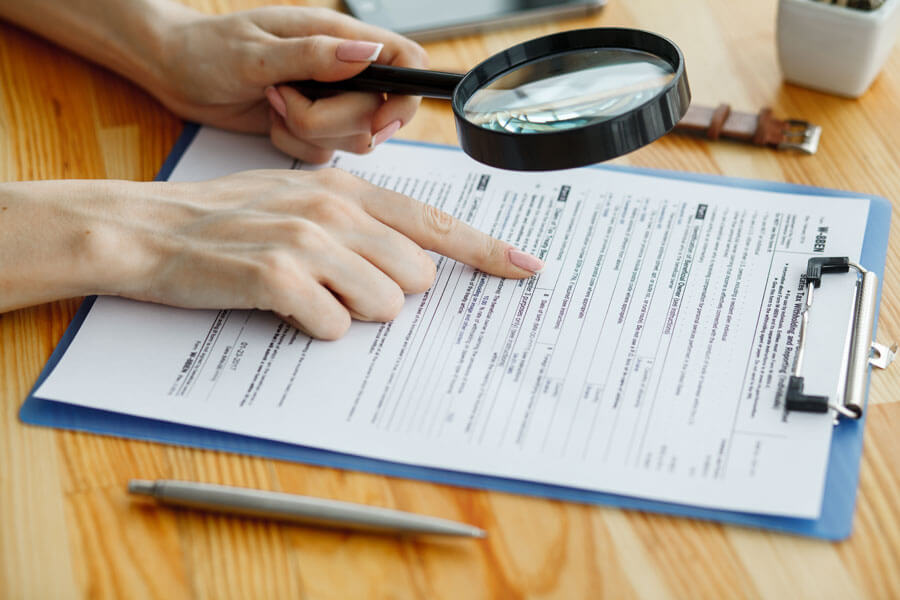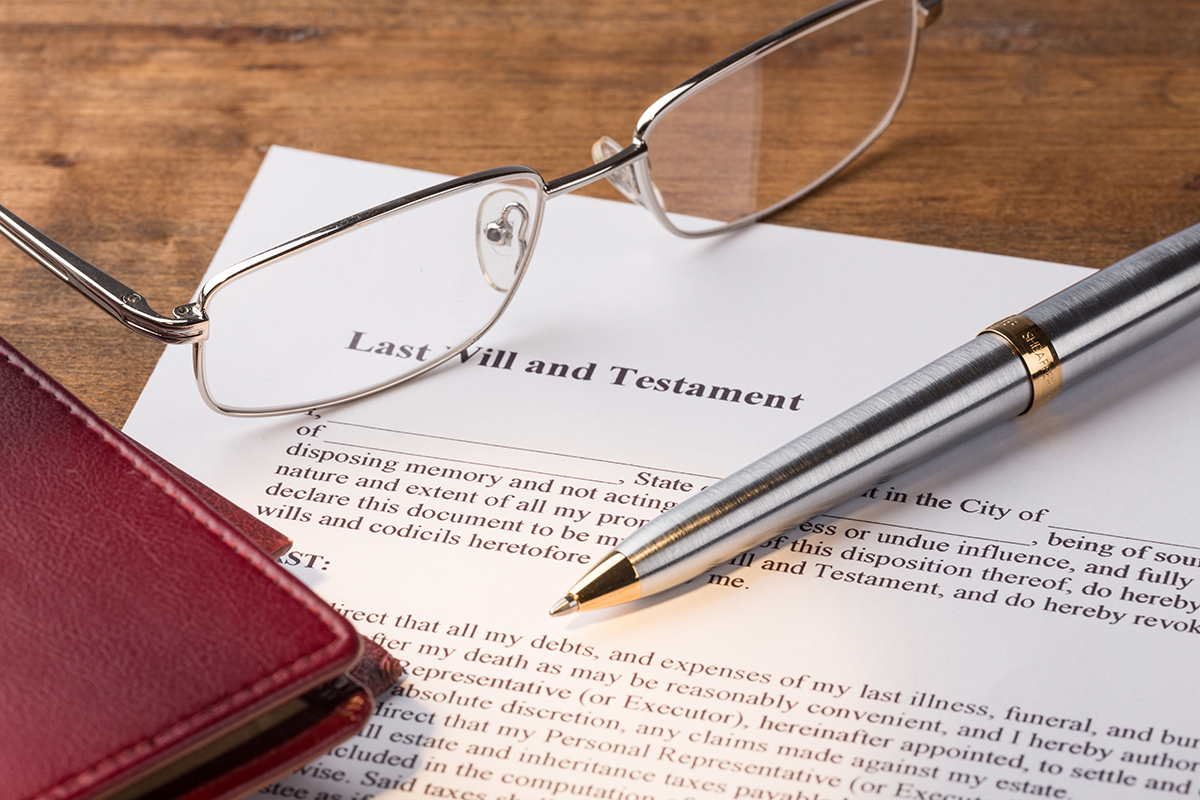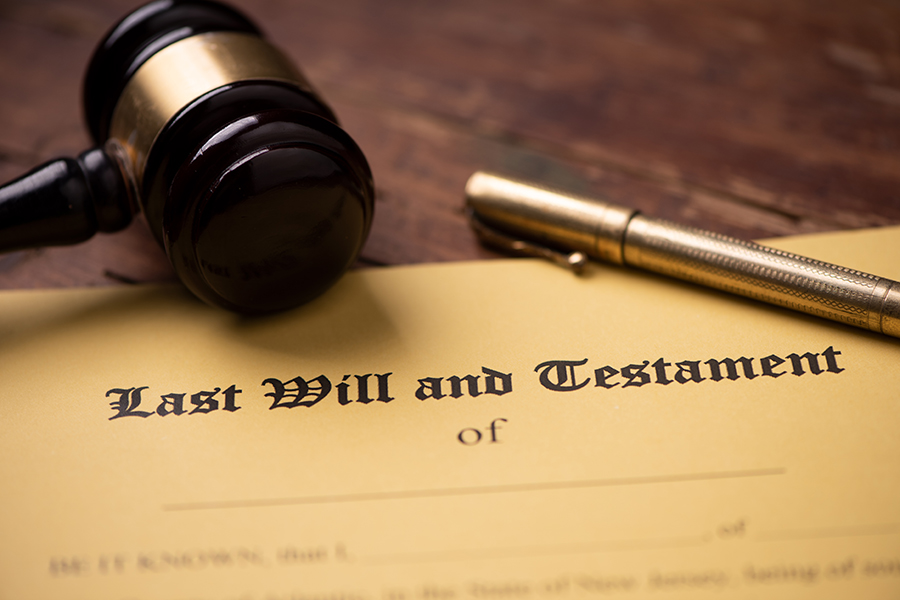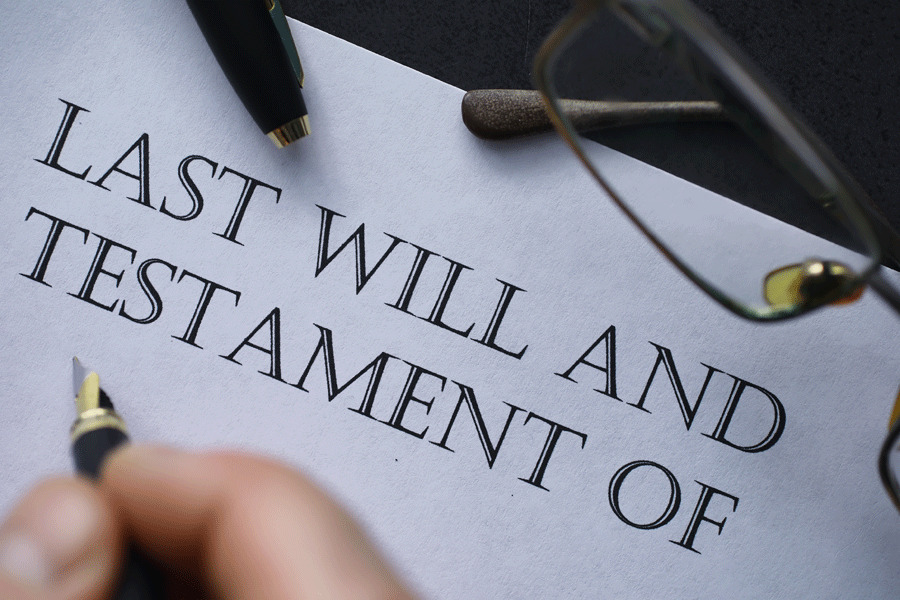A self-proving affidavit is a legal document that accompanies a will and affirms that the will was executed in accordance with the law.
It serves as evidence to the court that the will is valid, and the testator (the person making the will) had the capacity to make the will and was not under duress or undue influence at the time of execution.
To make such an affidavit, the testator and witnesses must sign the affidavit in front of a notary public. The notary public will then sign and affix their seal to the affidavit, which confirms that the signatures on the affidavit are authentic.
For a self-proving affidavit to be valid, it must meet the following requirements:
- The testator and witnesses must sign the affidavit in front of a notary public.
- The notary public must sign and affix their seal to the affidavit.
- The affidavit must be attached to the will.
It is important to note that not all states require this affidavit for a will to be valid. However, even in states where such an affidavit is not required, including one can help to expedite the probate process and make it easier for your family to manage your estate.
Self-Proving Affidavit Forms
Given below are different affidavit forms for you:
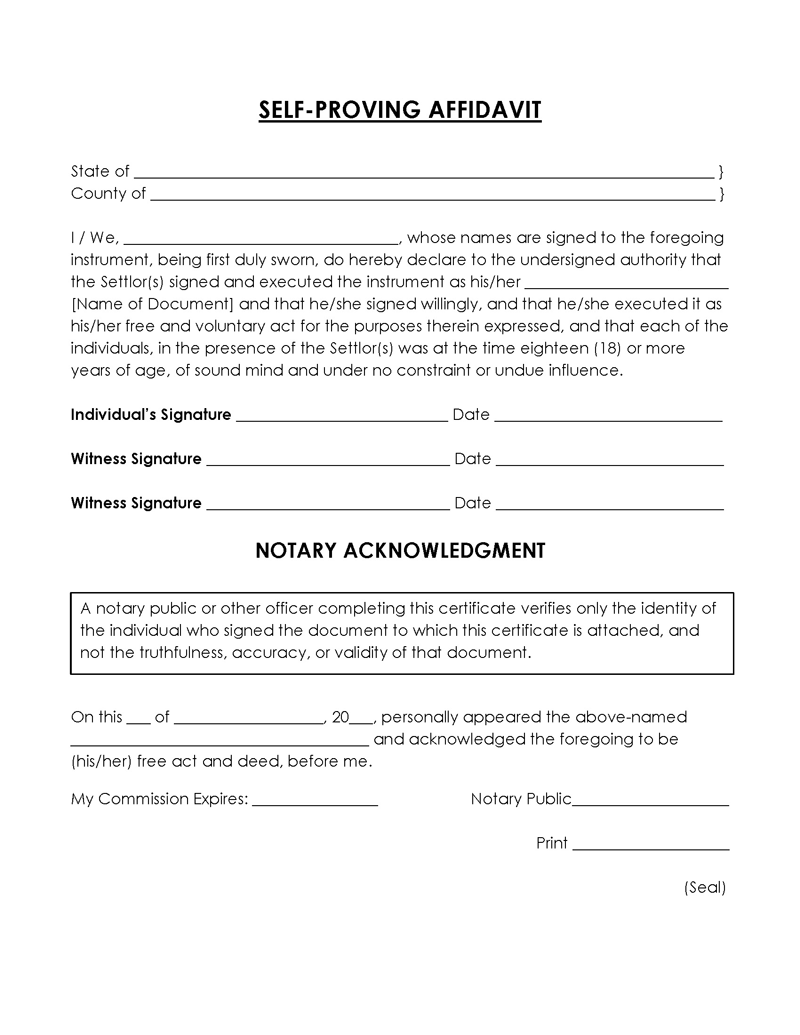
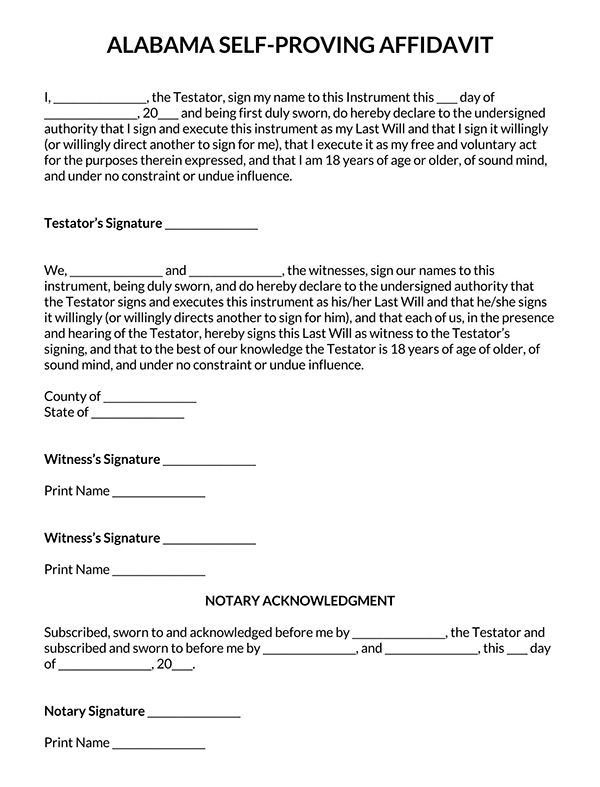
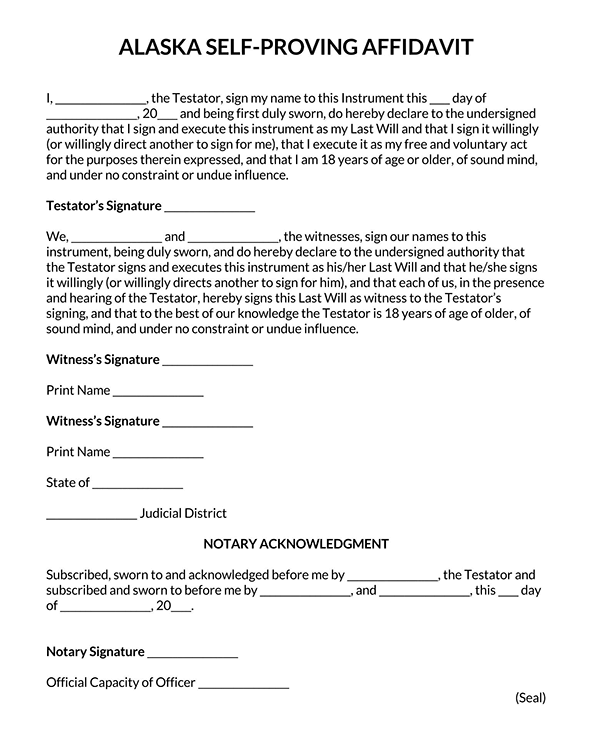
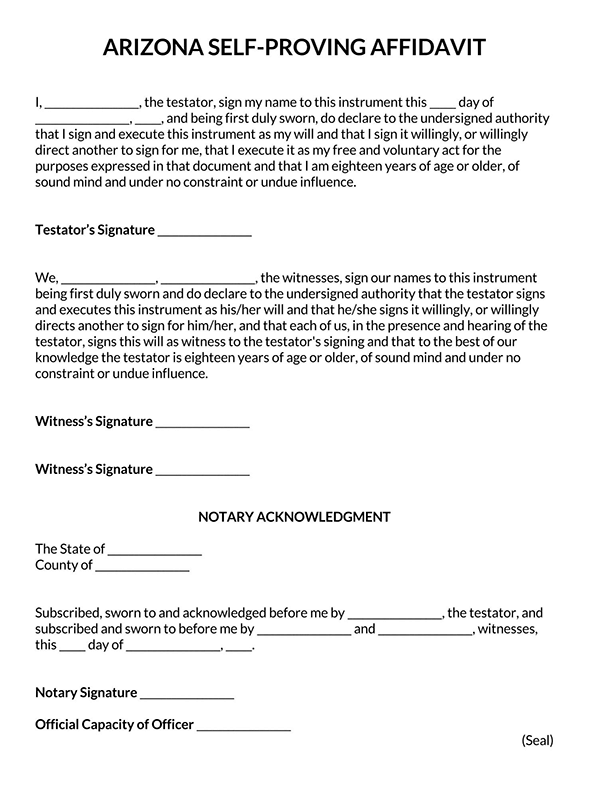
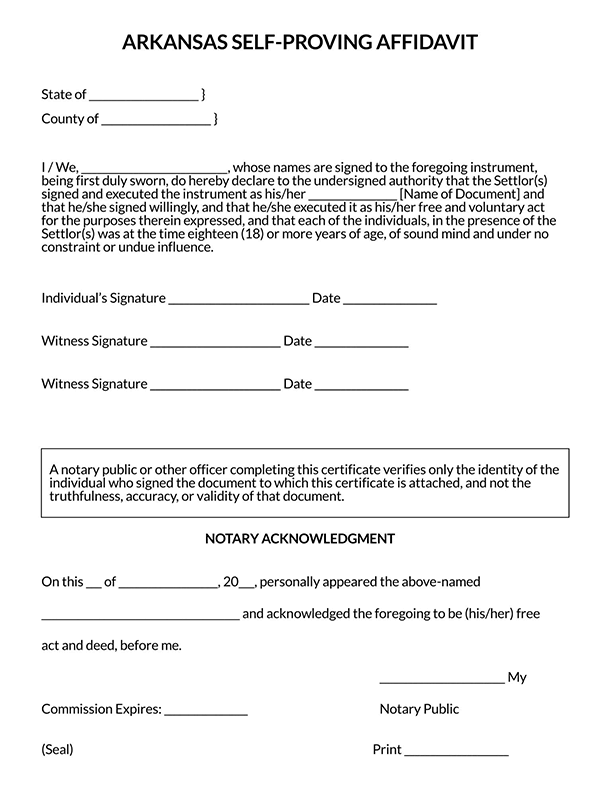
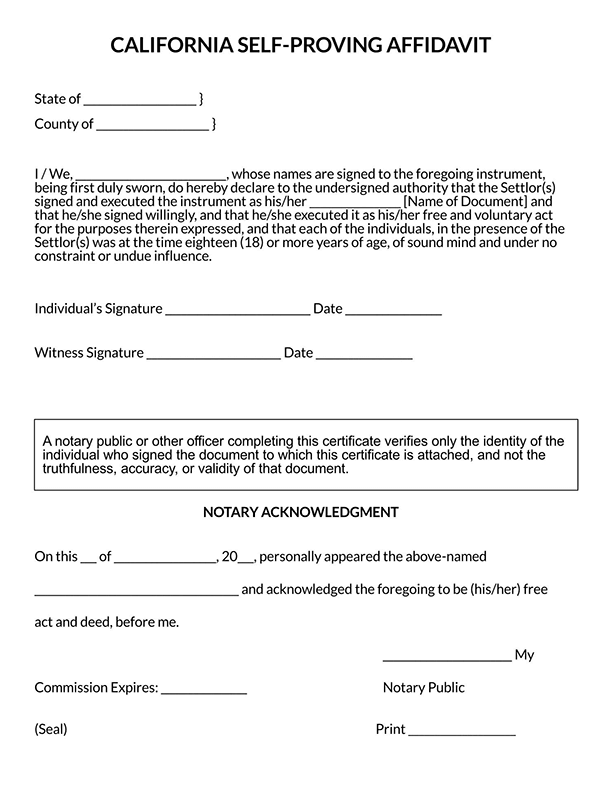
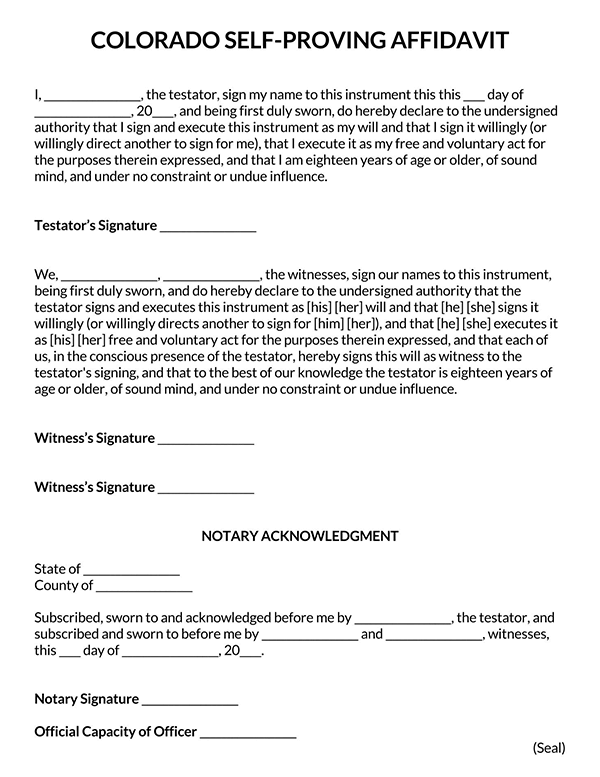
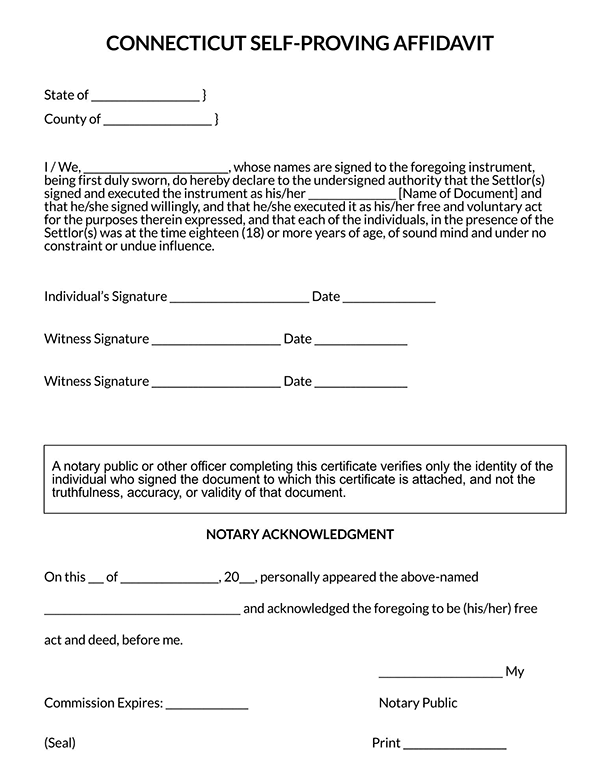
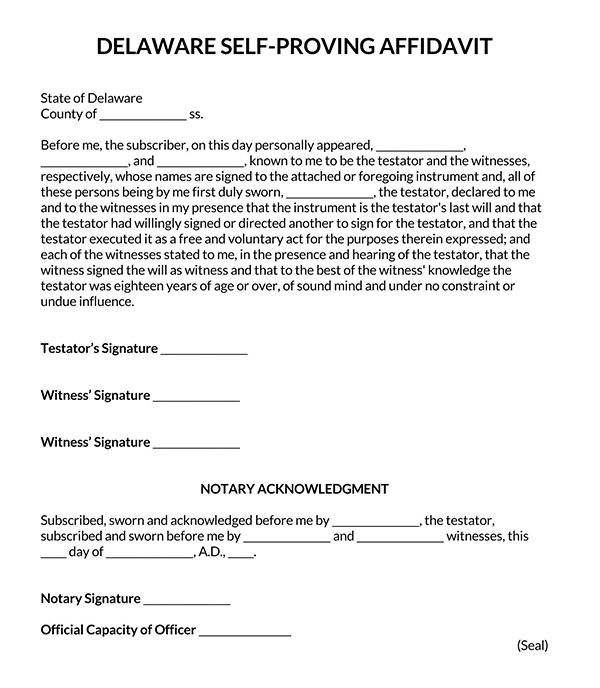
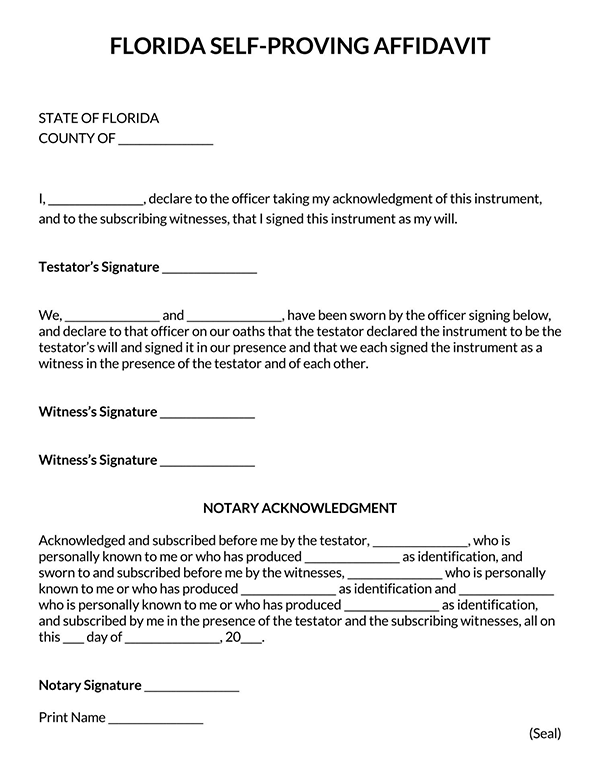
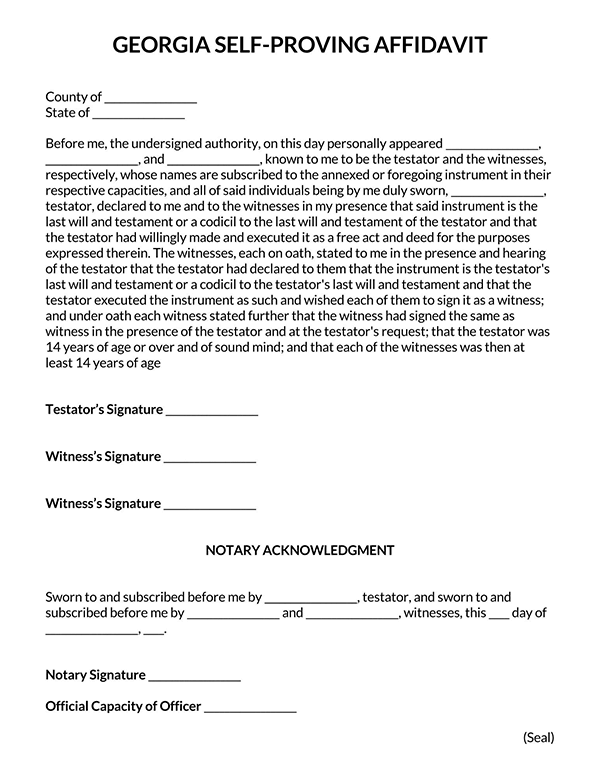
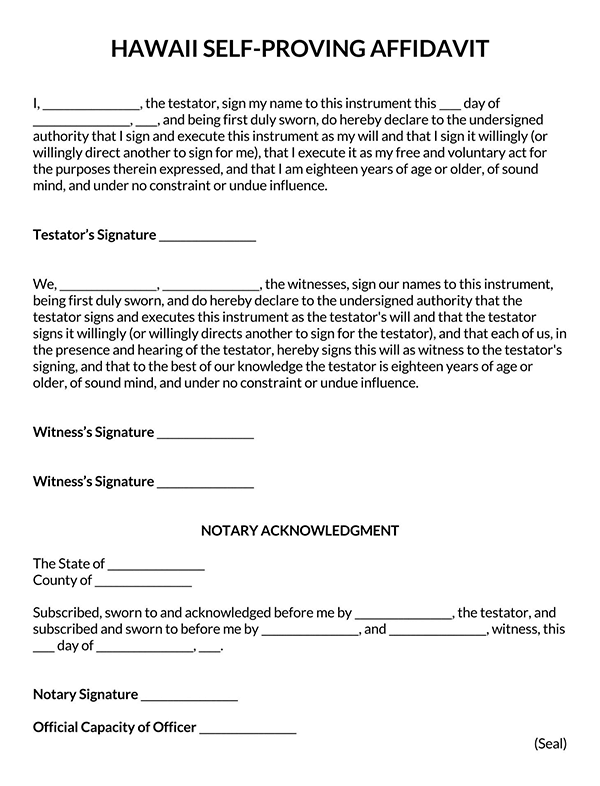
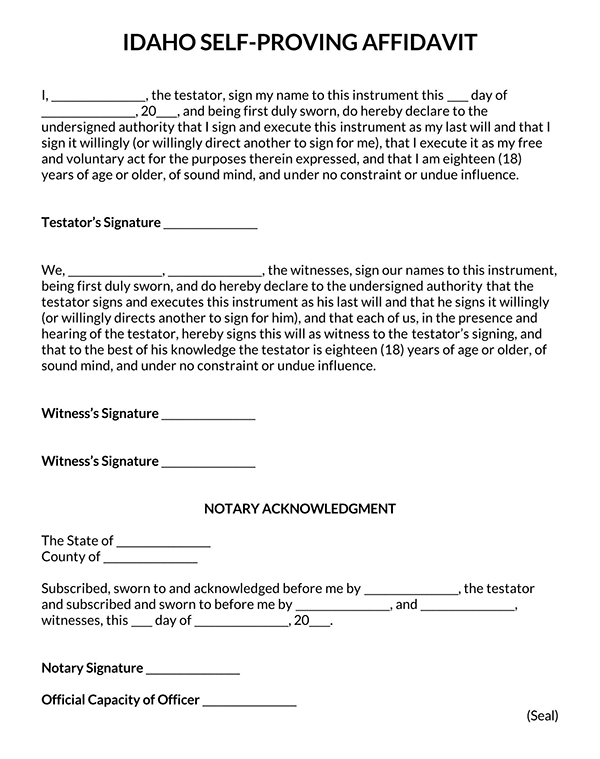
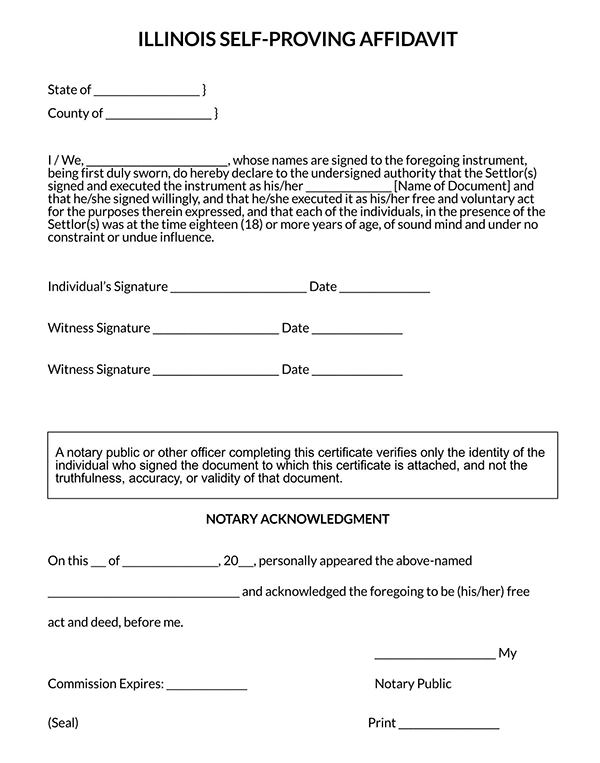
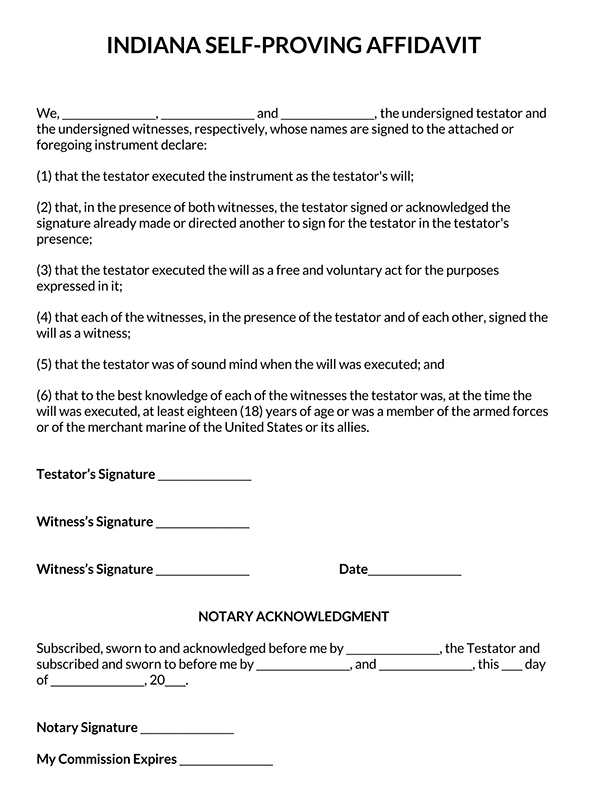
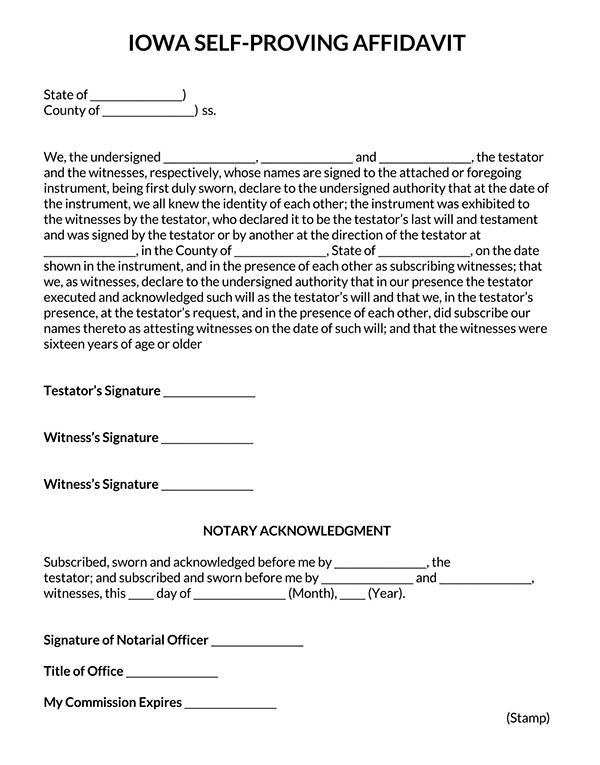
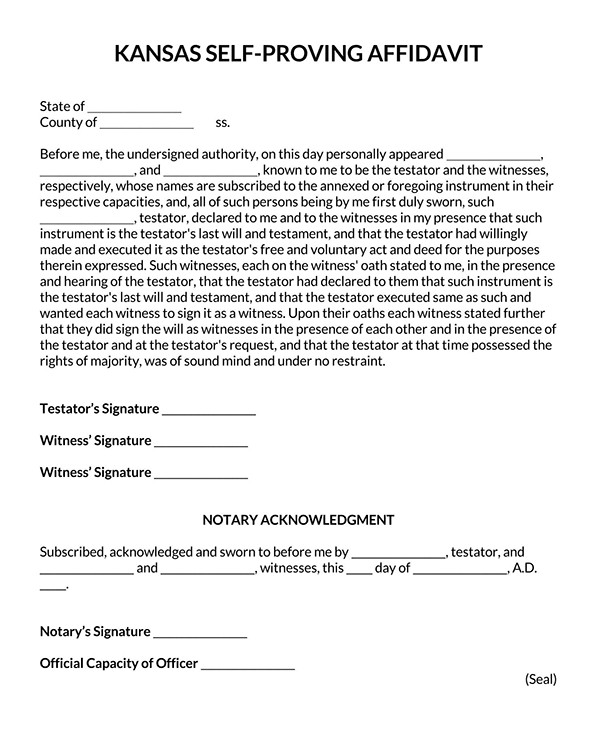
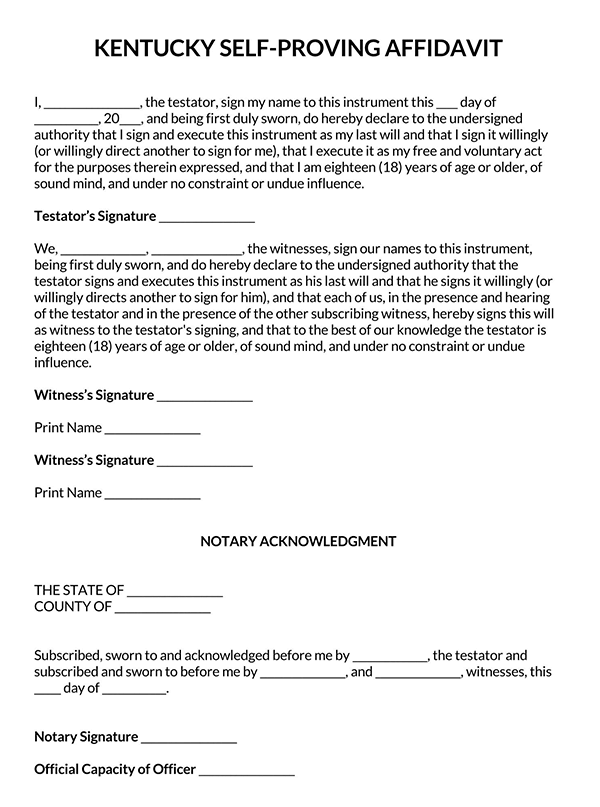
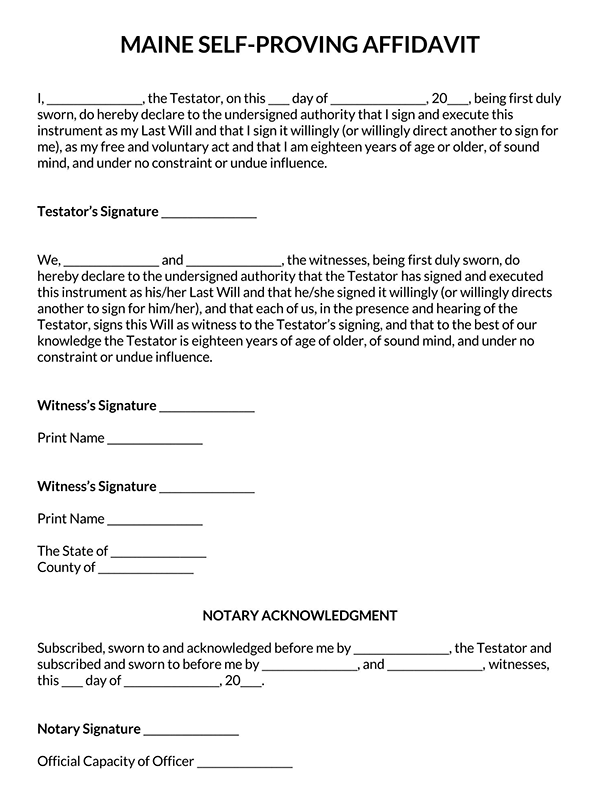
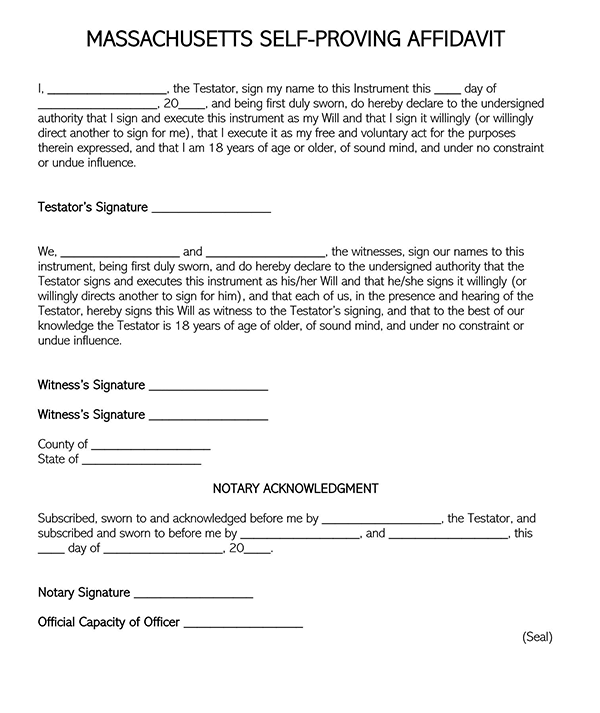
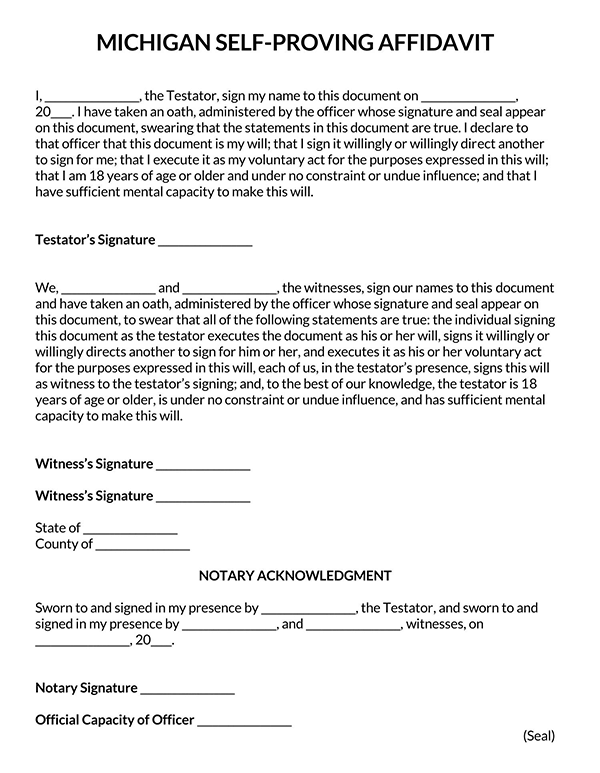
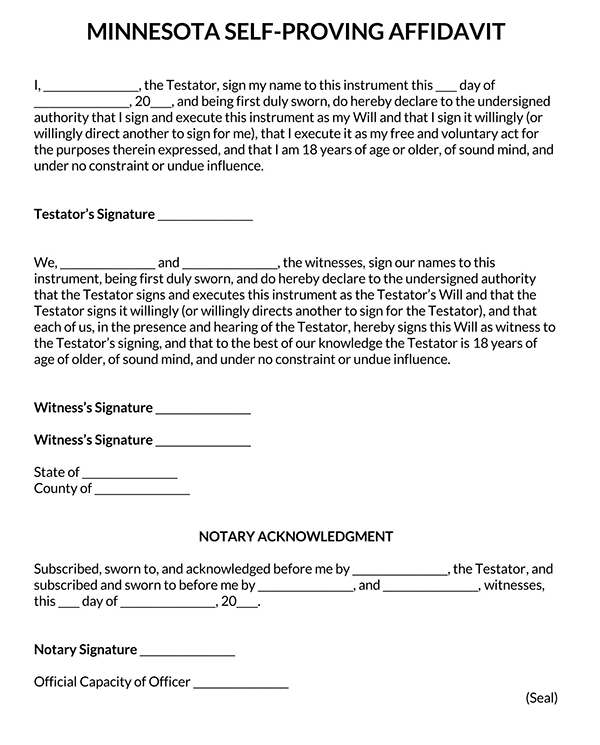
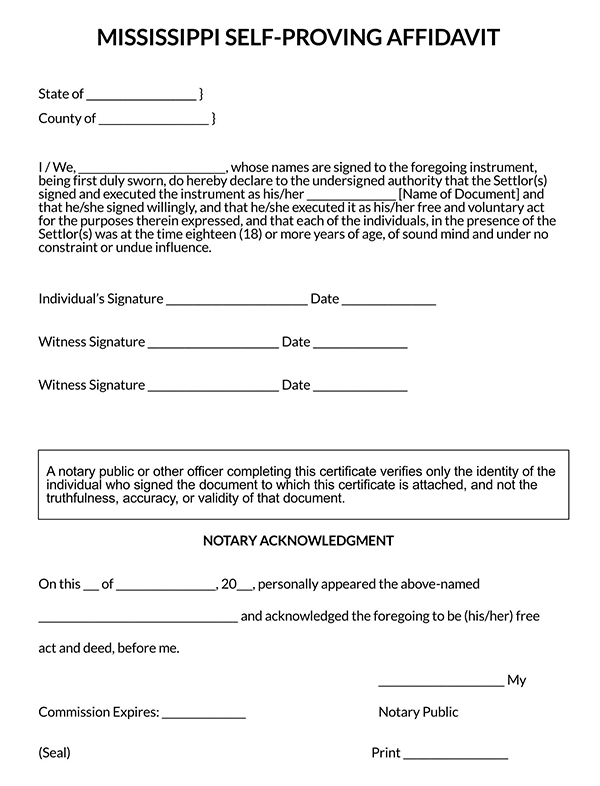
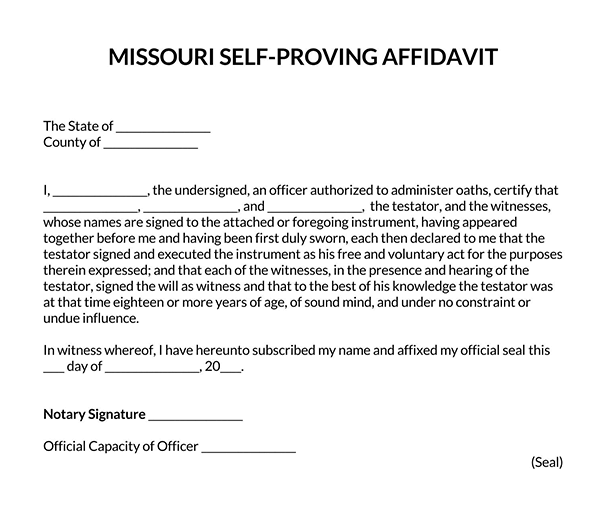
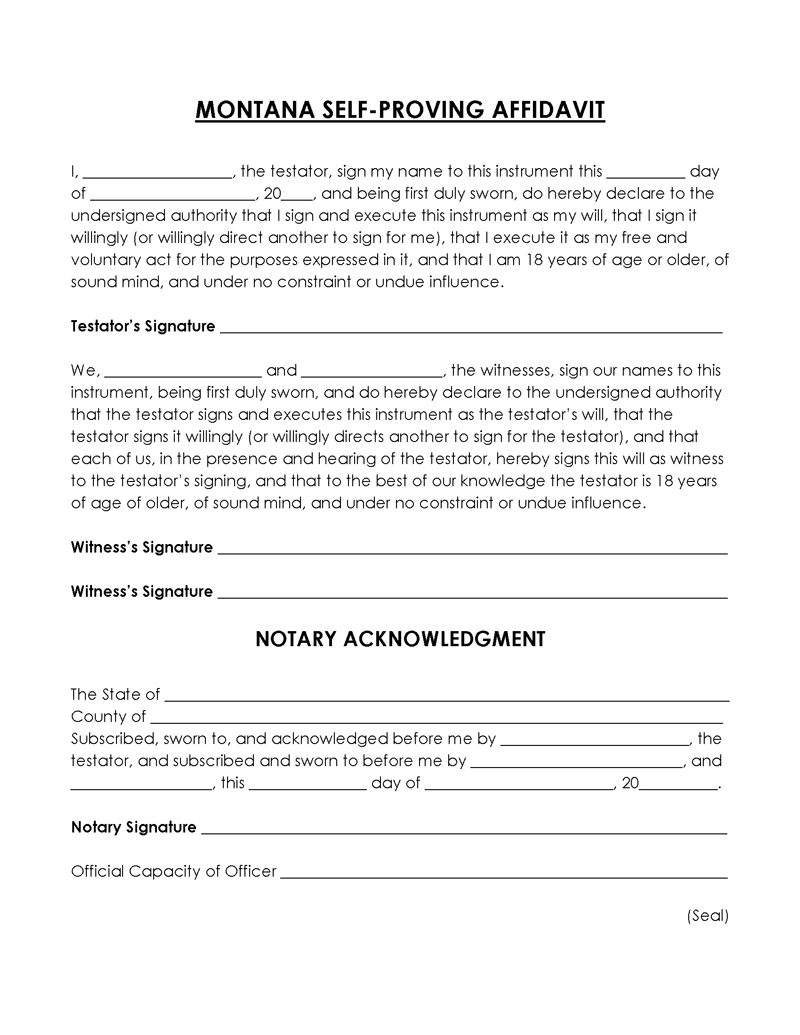
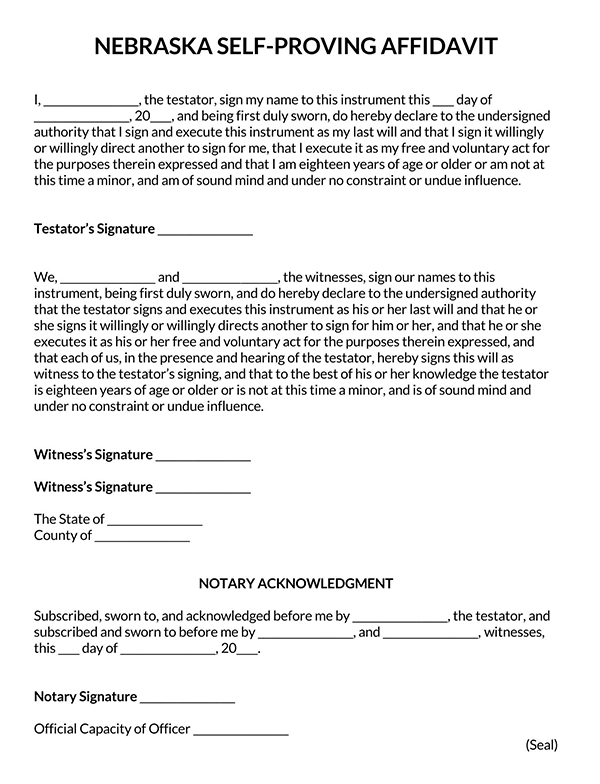
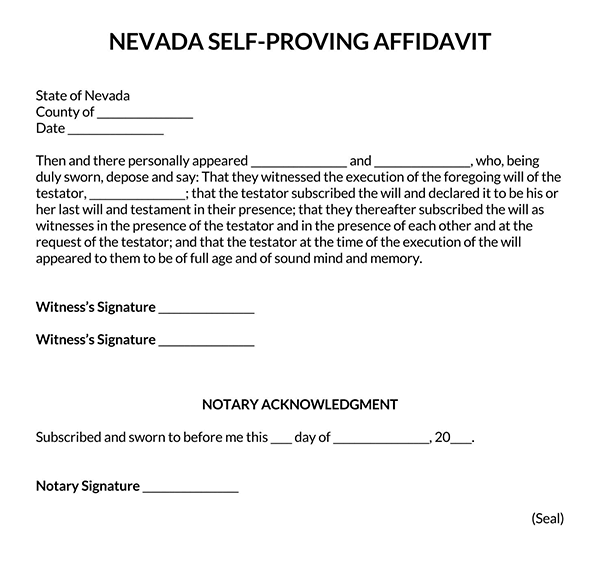
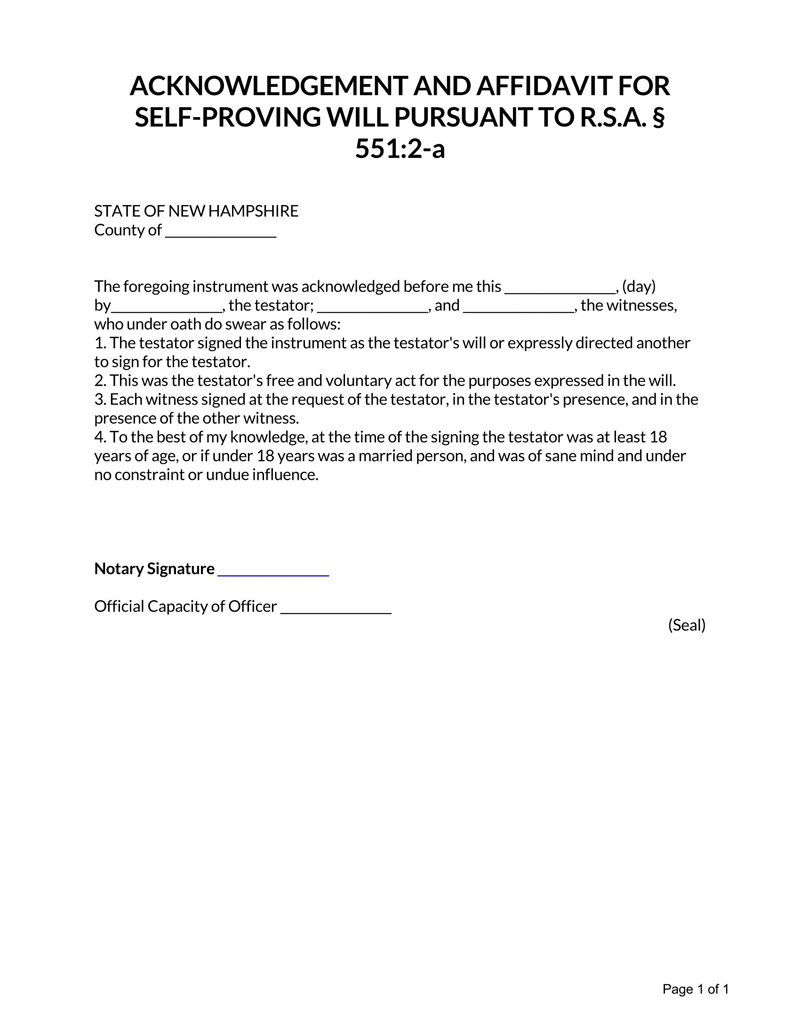
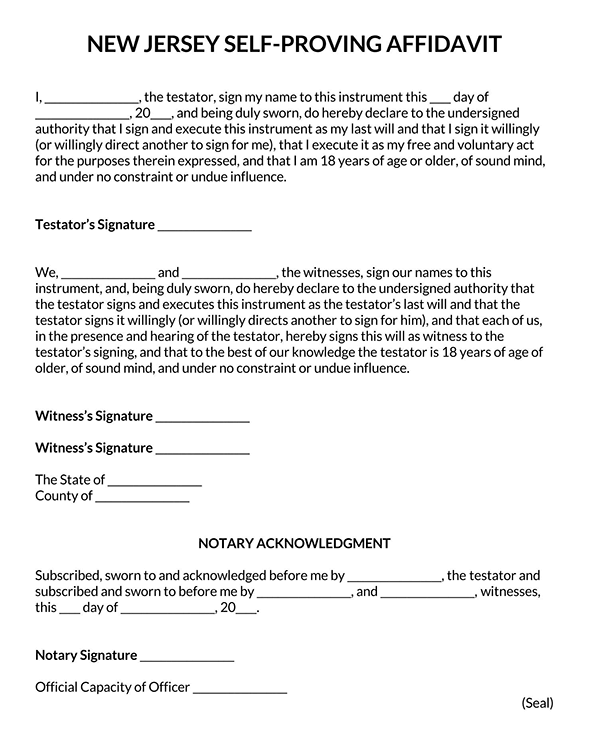
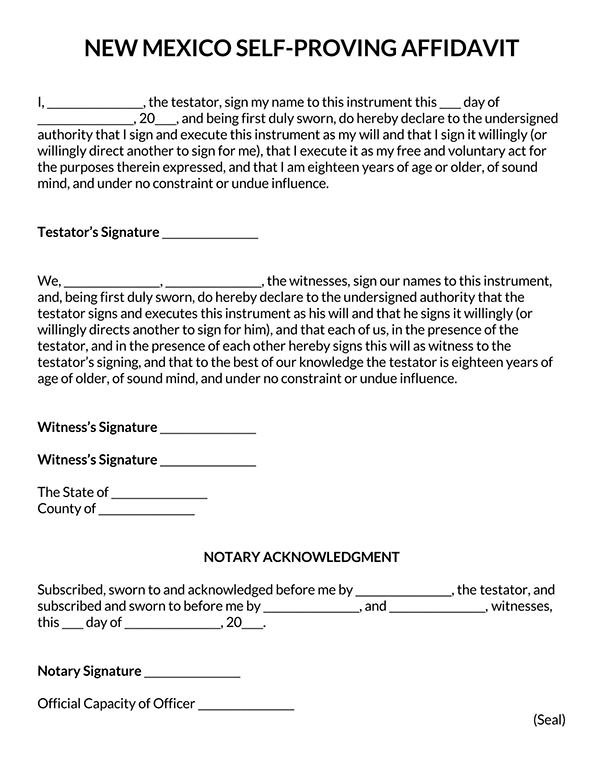
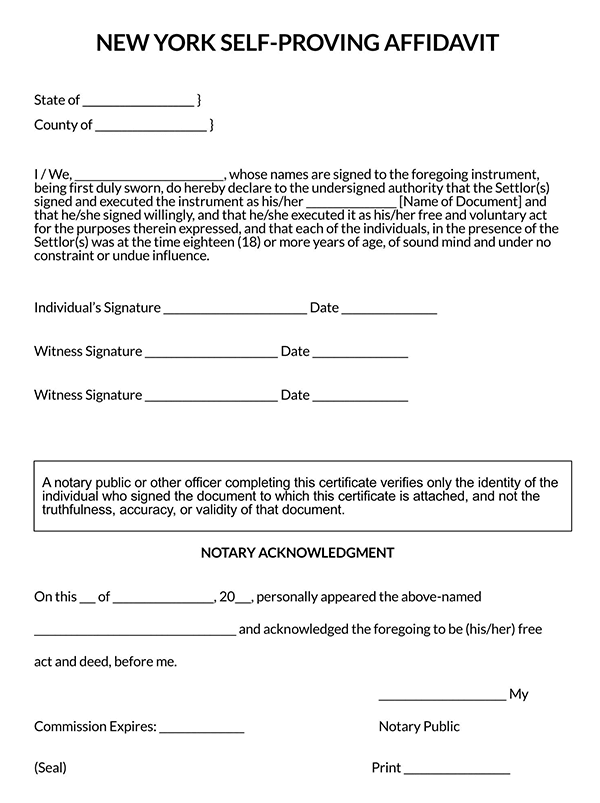
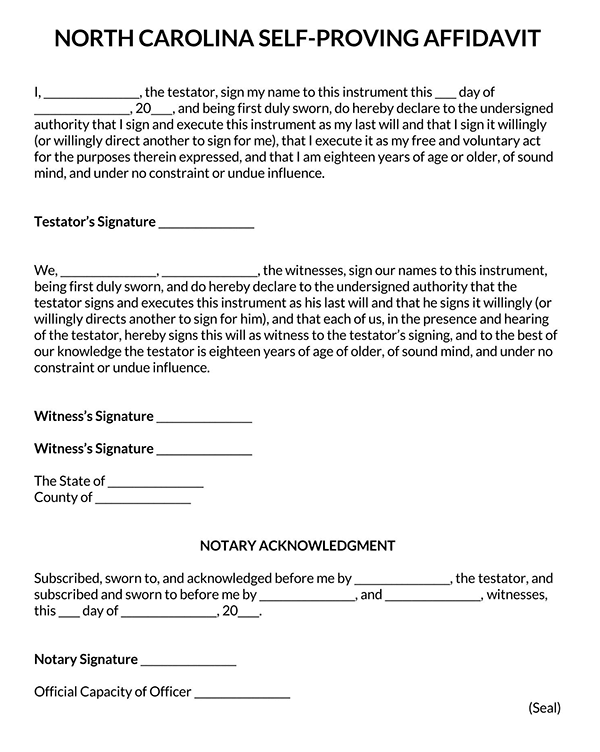
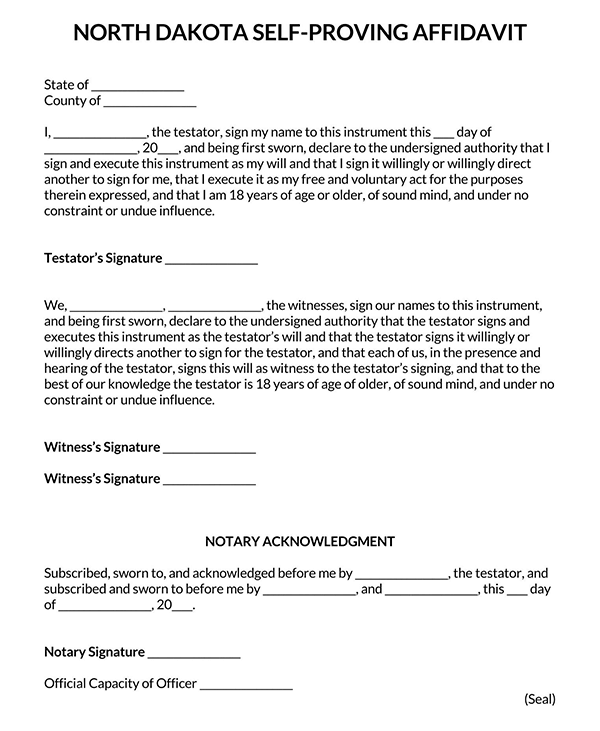
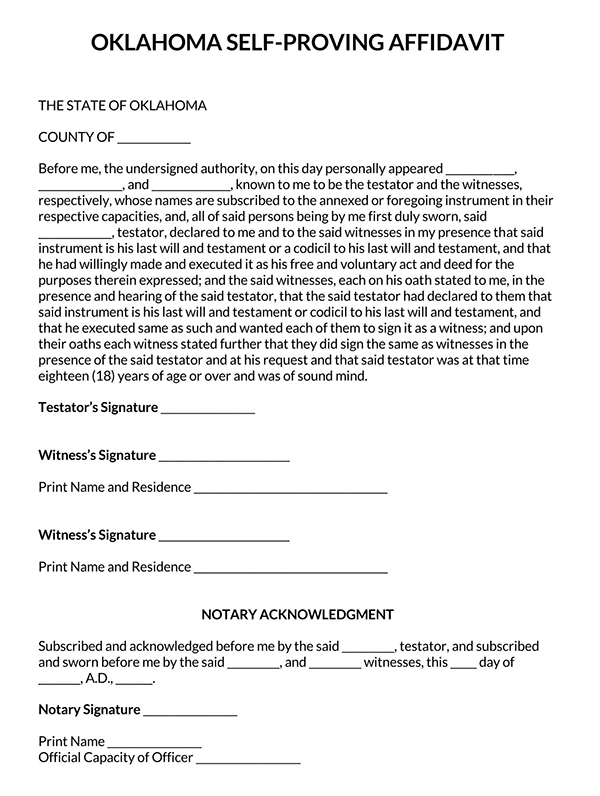
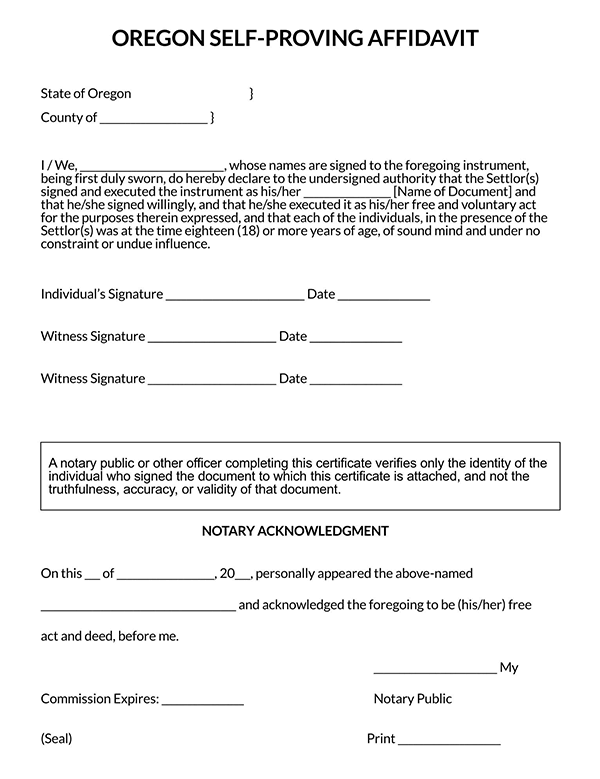
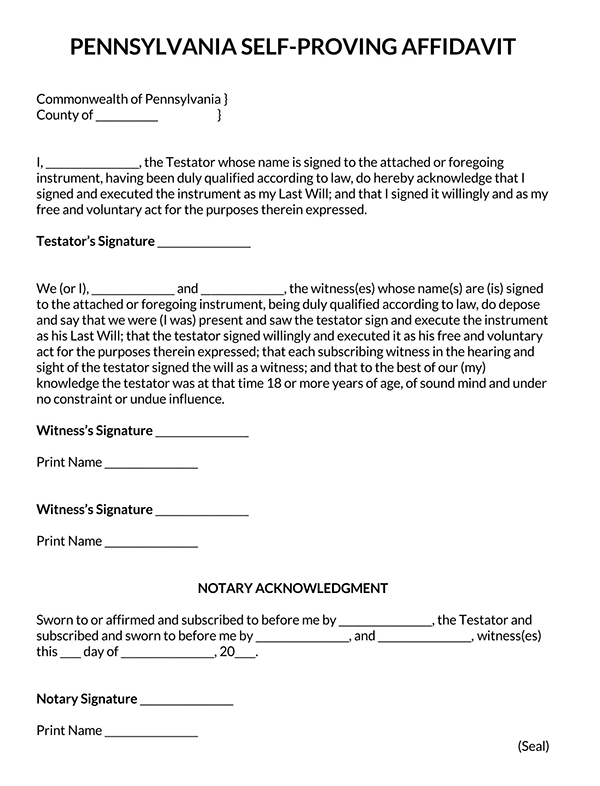
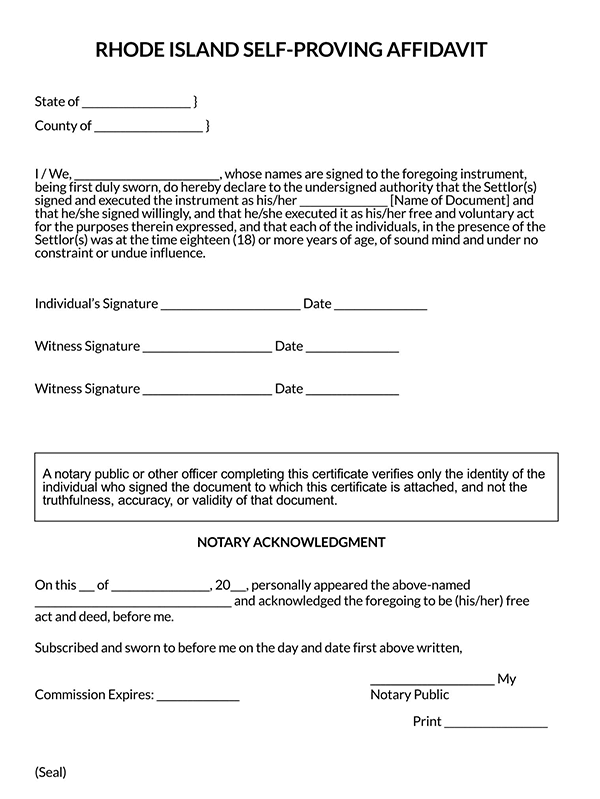
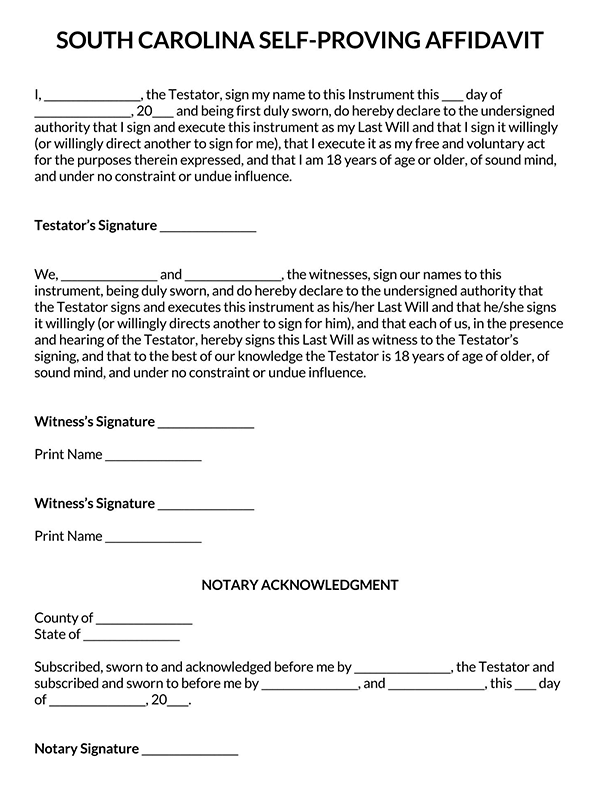
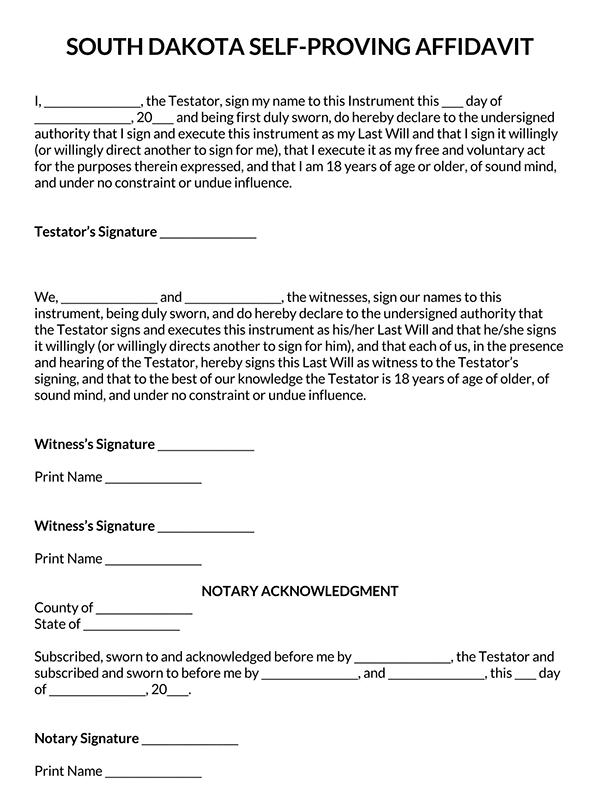
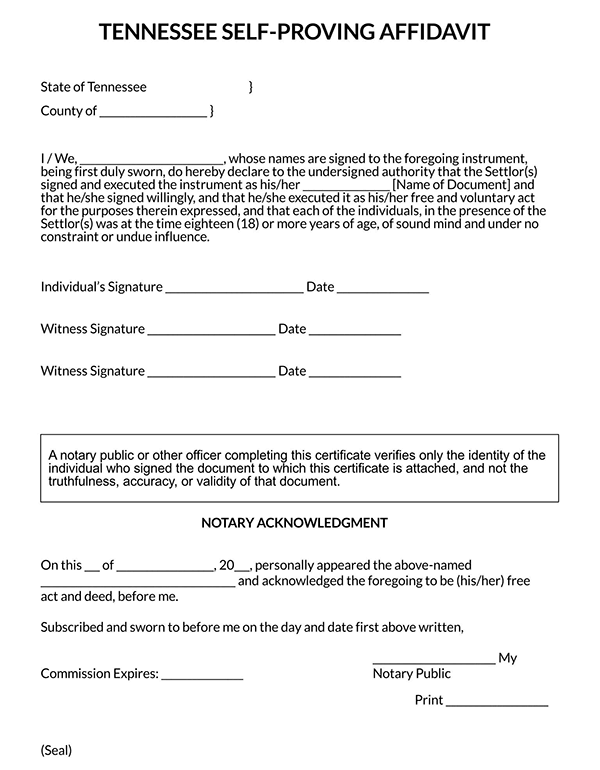
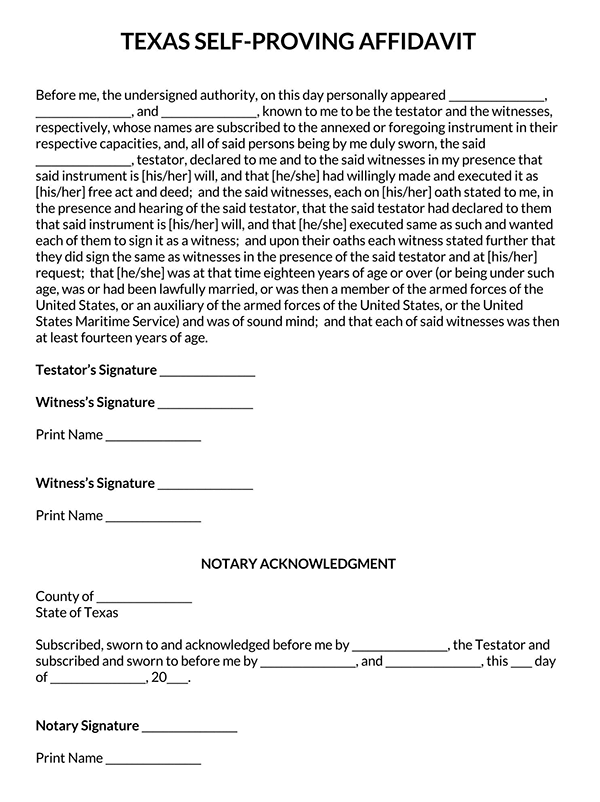
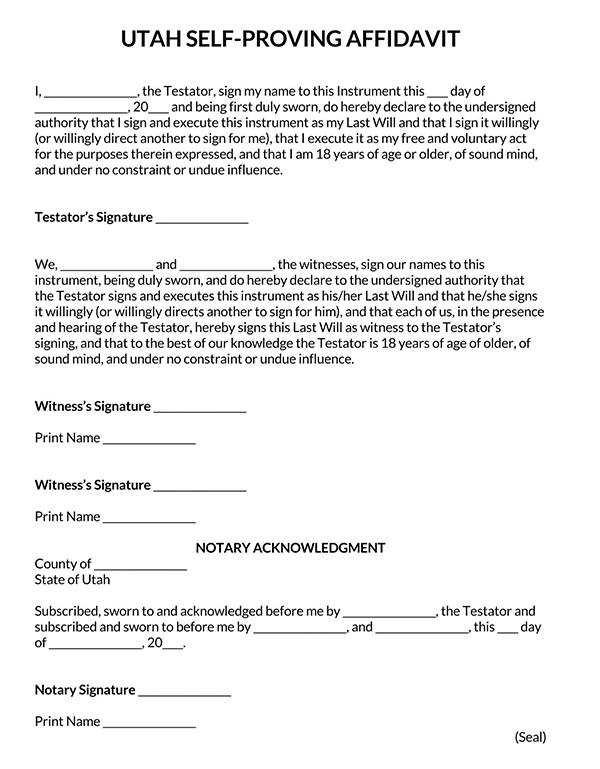
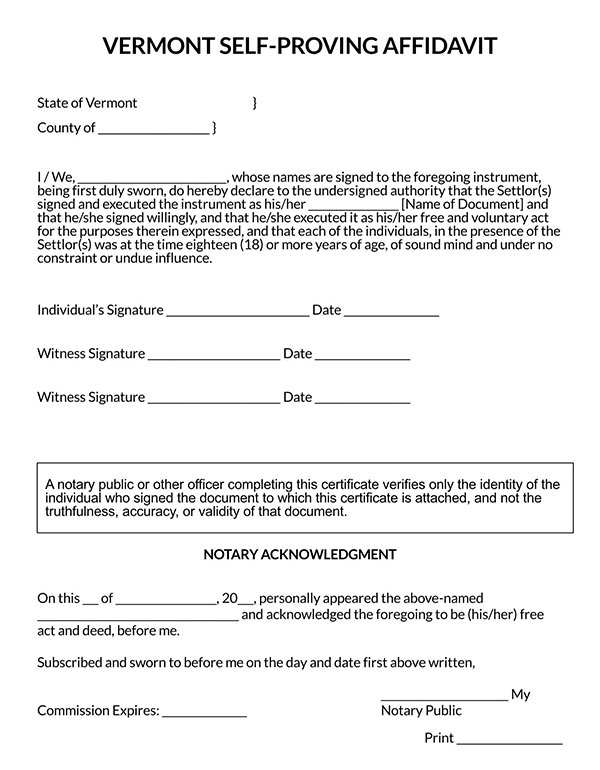
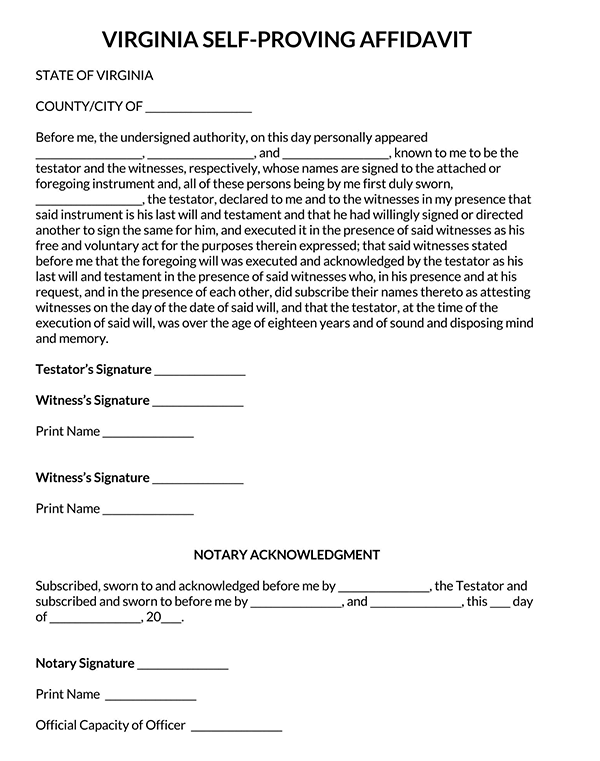
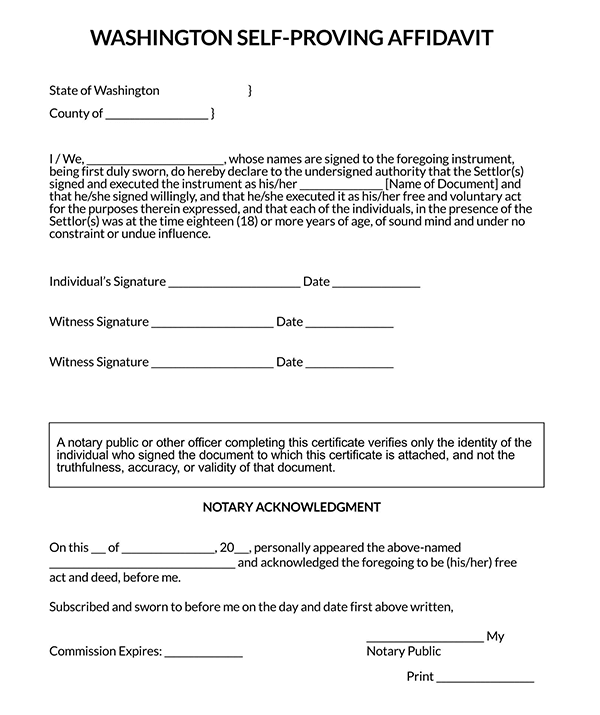
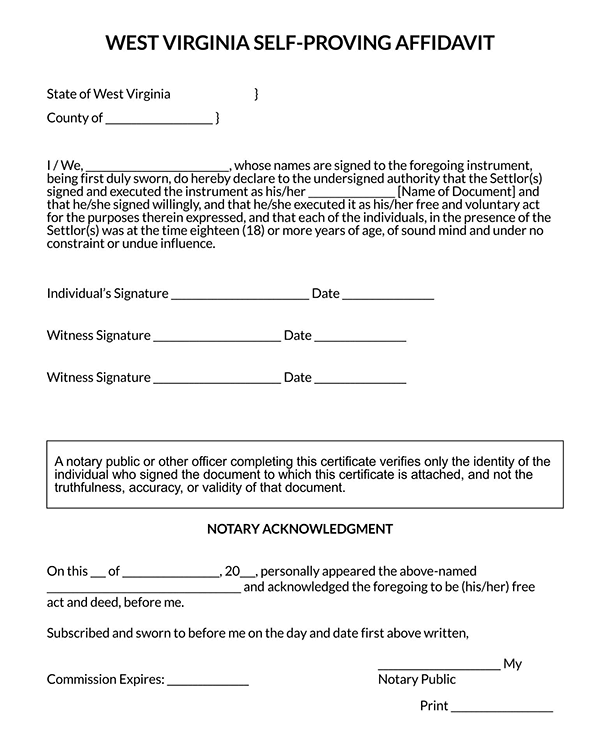
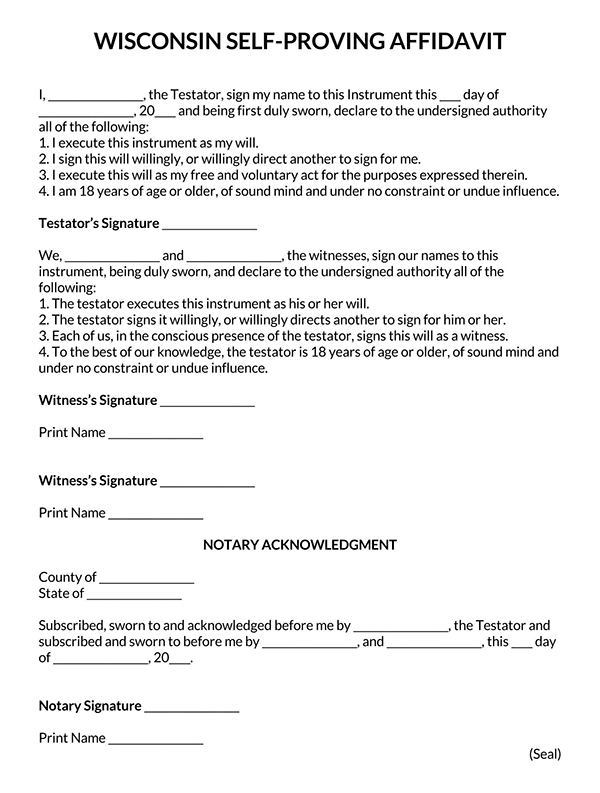
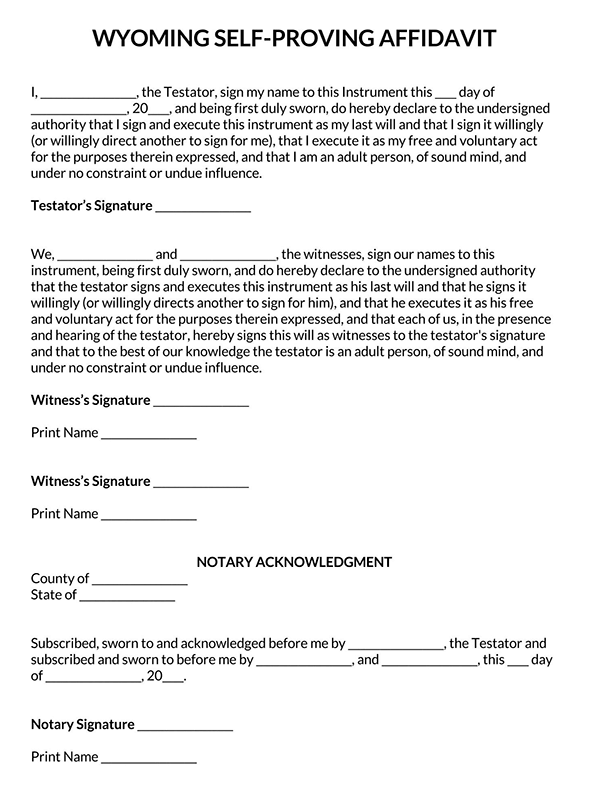
Self-Proving Affidavit
It is a legal document that must be signed by the testator and witnesses in front of a notary public.
The affidavit should contain the following information:
- A statement that the testator is over the age of 18 and of sound mind
- A statement that the attached will is the testator’s last will and testament
- A statement that the testator signed the will in the presence of the witnesses and that the witnesses signed the will in the presence of the testator
- A statement that the testator and witnesses signed the affidavit in the presence of a notary public
- The notary public’s signature and seal
Including a self-proving affidavit with a will can help to expedite the probate process and make it easier for your family to manage your estate. While some states do not require such an affidavit, it is generally recommended to include one, as it can help to prevent challenges to the validity of the will.
If you are unsure whether your state requires this affidavit, you should consult with an attorney or other legal professional.
Purpose of Self-Proving Affidavit
The primary purpose of this affidavit is to provide evidence to the court that a will was executed in compliance with the law. By signing the affidavit in front of a notary public, the testator and witnesses confirm that the testator was of sound mind and understood that they were signing their last will and testament.
In addition to confirming the validity of the will, a self-proving affidavit can also protect the testator’s family in the event that a third party questions the validity of the will. Because the witnesses have signed the affidavit, they can be summoned to testify in court as to the validity of the will. If the witnesses cannot be located, the notary public who witnessed the signing of the will can testify in court.
Furthermore, this affidavit is considered to be conclusive proof of the will’s validity, which means that the court will not require additional evidence to prove the will’s validity. This can help to expedite the probate process and make it easier for the testator’s family to manage their estate.
When is a Self-Proving Affidavit Not Required to Make Will?
In some cases, a self-proving affidavit may not be required to prove the validity of a will. This is because there are certain minimum requirements that a testator must fulfill in order to create a valid will in every state.
These requirements include:
- Being at least 18 years old
- Being of sound mind
- Preparing and signing the will
- Having the will witnessed by two witnesses who are not beneficiaries in the will
If these requirements are met, then the will is considered to be valid without the need for a self-proving affidavit.
note
It is important to note that even in cases where this affidavit is not required, including one with the will can help to expedite the probate process and make it easier for your family to manage your estate.
How Can Self-Proving Affidavit Benefit You to Prove Will?
This affidavit can benefit a testator and their family in several ways. Because the affidavit is signed by the testator and two witnesses under oath of perjury, the will has a double layer of proof of its validity. The witnesses who attest to the will also confirm that the testator was of sound mind at the time the will was executed.
In addition, the notary public who witnesses the signing of the affidavit can be summoned to testify in court that the statements made in the affidavit by the testator and witnesses are factual. This can help to provide additional evidence to the court of the will’s validity.
Furthermore, a self-proving affidavit can help to expedite the probate process by excluding the need for witnesses to appear in court to testify as to the validity of the will. This can help to reduce complications that may arise if the original witnesses are unavailable or have passed away.
By including this affidavit with your will, you can provide additional assurance to your family that your will is valid and that they will not face unnecessary legal and court fees.
How to Get Self-Proving Affidavit?
Obtaining such an affidavit is a relatively simple process.
To get one, follow these steps:
Step 1: Obtain a self-proving affidavit form
If your state allows the use of such affidavits, the state will usually provide a template or basic guidelines on how the affidavit should be worded. You can also find templates online or have an attorney prepare the affidavit for you.
When filling out the form, it should contain the following information:
- A statement that the document is the last will and testament of the testator
- A statement that the witnesses were present when the testator signed the will and that they signed it as witnesses
- A statement that the testator signed the will in the presence of the witnesses and that they believed the testator was of sound mind and knew the contents of the will
- A statement that the witnesses signed the affidavit in the presence of the testator and each other
- A statement that the affidavit is being made under oath and penalty of perjury
Step 2: Gather two disinterested witnesses
You will need to find two independent witnesses who do not stand to benefit from your will. The witnesses must be of legal age in your state and able to attest to your signature on the affidavit. In some states, witnesses must also have a certain level of mental capacity and may not have a criminal record.
Step 3: Schedule an appointment with a notary
You will need to have the affidavit signed and attested to by a notary public. The notary public can be an estate attorney, bank representative, or licensed notary. The notary will confirm the identity of the testator and witnesses and will witness the signing of the affidavit.
note
It is important to note that the affidavit must be signed and notarized in the presence of the notary public to be valid.
Step 4: Sign the affidavit and store it with the will
Once you have gathered all necessary documents and witnesses, have the witnesses attest to your signature in the notary public’s presence. Sign the affidavit and attach it to your will, then store both documents in a safe place.
note
It is important to store these documents in a secure location that is easily accessible to your loved ones in the event of your passing.
How to Write Self-Proving Affidavit?
Filling out a self-proving affidavit is a relatively straightforward process. To fill out one, follow these steps:
Step 1: Start with the paperwork
To begin, gather your witnesses, the notary public, and all necessary paperwork. The notary public should verify the identity of the witnesses attesting to your signature. Once you have all the required materials, you may begin filling out the affidavit.
Step 2: Indicate location from where form is implemented
Your self-proving affidavit form has two blank lines on the upper left that you need to fill to identify where the affidavit will be enforced. Indicate the state and country as listed in the self-proving affidavit form, respectively.
Step 3: Provide the identity of the witnesses
The primary paragraph of the form has blank spaces where the witnesses will identify themselves by indicating their names. The identification would need the witnesses to show up in person with a document to prove their identity to the notary public.
Step 4: Identify the paperwork with the document
Since your affidavit is made concerning a specific document that needs to be identified, there is a second blank space on the main paragraph of the form where you need to indicate the exact document you will be attaching the affidavit.
EXAMPLE
‘The last will of William Herring.’
Step 5: Sign of each party
Below the main paragraph of the form, there are three signature lines for you and your witnesses. Ensure each person appends their signature in the correct blank space and indicates the date of signing after their signature.
Step 6: Verification and notarization by the notary
At the bottom of the form, there are blank spaces for the notary public to verify your identity and that of your witnesses. The notary indicates that they have seen you and your witnesses sign the form that day; after this, the notary provides commission information and stamps the form with their seal.
note
It is important to note that the affidavit must be signed and notarized in the presence of the notary public to be valid.
Additionally, it is a good idea to review the affidavit form carefully before signing to ensure that all necessary information has been included in the self-proving affidavit form.
Signing Requirements
As highlighted above, each state has its law regarding the requirements to be fulfilled when making such an affidavit. Most states require you to have two independent witnesses to attest to the signature you will append on the form and the stamp of a notary public.
The table below highlights the applicable signing requirements for each state:
| State | Witness and Notary Public | State Law |
| AL | 2 Witnesses and a Notary Public | § 43-8-132 |
| AK | 2 Witnesses and a Notary Public | § 13.12.504 |
| AZ | 2 Witnesses and a Notary Public | § 14-2504 |
| AR | 2 Witnesses and a Notary Public | § 28-25-106 |
| CA | 1 Witnesses | § 8220 |
| CO | 2 Witnesses and a Notary Public | § 15-11-504 |
| CT | 1 Witnesses and a Notary Public | § 45a-285 |
| DE | 2 Witnesses and a Notary Public | § 12-13-1305 |
| FL | 2 Witnesses and a Notary Public | § 732.503 |
| GA | 2 Witnesses and a Notary Public | § 53-4-24 |
| HI | 2 Witnesses and a Notary Public | § 560:2-504 |
| ID | 2 Witnesses and a Notary Public | § 15-2-504 |
| IL | 2 Witnesses | § 755-5-6-4 |
| IN | Separate Affidavit not required | § 29-1-5-3.1 |
| IA | 2 Witnesses and a Notary Public | § 633.279(2) |
| KS | 2 Witnesses and a Notary Public | § 59-606 |
| KY | 2 Witnesses and a Notary Public | § 394.225 |
| LA | Not Permitted | |
| ME | 2 Witnesses and a Notary Public | § 2-503 |
| MD | Not Permitted | |
| MA | 2 Witnesses and a Notary Public | § 2-504 |
| MI | 2 Witnesses and a Notary Public | § 700.2504 |
| MN | 2 Witnesses and a Notary Public | § 524.2-504 |
| MS | 2 Witnesses and a Notary Public | § 91-7-10 |
| MO | 2 Witnesses and a Notary Public | § 474.337 |
| MT | 2 Witnesses and a Notary Public | § 72-2-524 |
| NE | 2 Witnesses and a Notary Public | § 30-2329 |
| NV | 2 Witnesses and a Notary Public | §133-050 and § 133-055 |
| NH | Separate Affidavit not required | § 551-2-a |
| NJ | 2 Witnesses and a Notary Public | § 3B:3-4 |
| NM | 2 Witnesses and a Notary Public | § 45-2-504 |
| NY | 1 Witnesses and a Notary Public | § 1406 |
| NC | 2 Witnesses and a Notary Public | § 31-11.6 |
| ND | 2 Witnesses and a Notary Public | § 30.1-08-04 |
| OH | Not Permitted | |
| OK | 2 Witnesses and a Notary Public | § 84-55(5) |
| OR | 1 Witness and a Notary Public | § 113.055 |
| PA | 2 Witnesses and a Notary Public | 3132.1 |
| RI | 1 Witnesses and a Notary Public | § 33-7-26 |
| SC | 2 Witnesses and a Notary Public | § 62-2-503 |
| SD | 2 Witnesses and a Notary Public | § 29A-2-504 |
| TN | 1 Witnesses and a Notary Public | § 32-2-110) |
| TX | 2 Witnesses and a Notary Public | § 251-104 |
| UT | 2 Witnesses and a Notary Public | § 75-2-504 |
| VT | 2 Witnesses and a Notary Public | § 14-3-108 |
| VA | 2 Witnesses and a Notary Public | § 64.2-452 |
| WA | 1 Witnesses and a Notary Public | § 11.20.020 |
| WV | 1 Witnesses and a Notary Public | § 41-5-15 |
| WI | 2 Witnesses and a Notary Public | § 853-04 |
| WY | 2 Witnesses and a Notary Public | § 2-6-114 |
Frequently Asked Questions
No, it does not have to be notarized in most states. However, in some states, a self-proving affidavit can be attached to the will to make it easier to prove its validity in court. The affidavit must be signed by the testator, two witnesses, and notarized by a notary public.
If someone contests a will, having a self-proving affidavit can make it easier to prove the will’s validity. The affidavit creates a presumption of validity, making it more difficult for a challenger to succeed. Without such an affidavit, the court may need to call upon witnesses to validate the will, which can be time-consuming and expensive.
If you never make a self-proving affidavit, it may not impact the probate process in some cases. However, without an affidavit, the court may need to call upon witnesses to validate the will, which can prolong the probate process and lead to higher legal fees. Having such an affidavit can make the process easier for your family.

